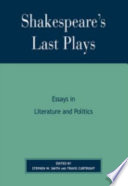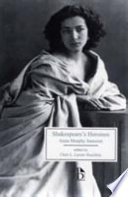 | Matt Goldish, Karl A. Kottman, Richard Henry Popkin, James E. Force - 2001 - 142 páginas
...I care not To get slips of them. Polixenes: Wherefore, gentle maiden. Do you neglect them? Perdita: For I have heard it said There is an art which in their piedness shares With great creating nature. Polixenes: Say there be: But nature is made better by no mean But nature makes that mean: so. o'er... | |
 | Mary Ann McGrail - 2002 - 200 páginas
...Shakespeare ultimately "sells out"— the famous conversation between Perdita and Polixenes on nature: Per. For I have heard it said There is an art which,...that art, Which you say adds to nature, is an art That nature makes. You see, sweet maid, we marry A gentler scion to the wildest stock, And make conceive... | |
 | Howard B. White - 1970 - 174 páginas
...means something more than nature in breeding. There is a passage in The Winter's Tale which may help: Yet nature is made better by no mean But nature makes...that art, Which you say adds to nature, is an art That nature makes. You see, sweet maid, we marry A gentler scion to the wildest stock, And make conceive... | |
 | Stephen W. Smith, Travis Curtright - 2002 - 264 páginas
...Winter's Tale, he has Polixenes dispute Perdita's distinction of art from "great creating nature": Yet Nature is made better by no mean But Nature makes...over that art Which you say adds to Nature, is an art That Nature makes. (4.4.89-92)1 At the end of the play, as if to validate Polixenes' doctrine, Hermione... | |
 | Agnes Heller - 2002 - 390 páginas
...Polyxenes in The Winter's Tale formulates Shakespeare's deepest convictions about nature. Perdita: "For I have heard it said / There is an art which...their piedness shares / With great creating nature." Polyxenes: "Say there be, /Yet nature is made better by no mean / But nature makes that mean. So over... | |
 | Verna V. Gehring - 2003 - 152 páginas
...creating nature." She complains there is "art" in their "piedness," or variegation. Polixenes replies: "Say there be; Yet nature is made better by no mean...over that art Which you say adds to nature, is an art That nature makes.... This is an art Which does mend nature—change it rather; but The art itself... | |
 | Rebecca W. Bushnell - 2003 - 220 páginas
...never set slips of "our carnations and streak'd gillvors, / (Which some call Nature's bastards)... For I have heard it said / There is an art which in...their piedness shares / With great creating Nature" (The Winter's Tale, 4.4.80-89). She protests that she will not plant even one of them, implicitly declaring... | |
 | Werner Beierwaltes, Jean-Marc Narbonne, Alfons Reckermann - 2004 - 608 páginas
...art which shares with "great creating nature". Polixenes replies that: ...nature is made better by no mean But nature makes that mean. So over that art Which you say adds to nature is an art That nature makes. . . . This is an art Which does mend nature- change it rather; But art itself is... | |
 | Mark Allen McDonald - 2004 - 334 páginas
...edition, p. 174), Polixenes responds to the reluctance of Perdita to crossbreed domestic and wild flowers: Yet nature is made better by no mean But nature makes that mean; so over art, Which you say adds to nature, is an art That Nature makes. Mary Nichols discusses this understanding... | |
 | Anna Murphy Jameson - 2005 - 472 páginas
...I care not To get slips of them. POLIXENES. Wherefore, gentle maiden, Do you neglect them? PERDITA. For I have heard it said There is an art, which in...their piedness, shares With great creating nature. POLIXENES. Say there be; Yet nature is made better by no mean, But nature makes that mean: so o'er... | |
| |